30 May 2024: Ahead of the start of next week’s Leaving Cert and Junior Cert exams the Irish Pharmacy Union (IPU) has issued advice to students and parents to help maintain their wellness and wellbeing in the weeks ahead.
Addressing the over 100,000 exam students about to sit their exams the IPU’s Acting Head of Professional Services Sinéad McCool said, “From English paper one on Wednesday through to your final exam will be a busy and tiring few weeks. No one wants their exam performance or preparation disrupted by illness or other health challenges, and while they cannot be entirely prevented there are sensible steps everyone can take.
“Even minor ailments such as hay fever can have a severe impact on concentration. Taking these simple precautions will help you maintain your performance.”
Tips from Pharmacists to Support Exam Student Wellness and Wellbeing:
1. Hay Fever – Unfortunately, exam season and hay fever season coincide. Those who suffer from hay fever should take steps to ensure that the condition does not flare up during their exams. Simple steps such as keeping doors and windows closed in mid-morning and early evening can help. If you need to take antihistamines, make sure that you take ones which do not cause drowsiness.
2. Headaches – Students who wear glasses or contact lenses should make sure to do so when they are studying so as not to strain their eyes. Study in a well-ventilated room and take regular breaks.
3. Dehydration – Drink lots of water, avoid too much coffee or stimulant drinks as they can cause dehydration.
4. Stomach upsets – Try to eat your regular meals even if you are nervous. Avoid spicy foods or foods that you know do not agree with you.
5. Diarrhoea or constipation – Stress can cause disruption to a student’s digestive system which could result in diarrhoea or constipation. If a student is constipated, they should drink plenty of water and eat fruit and high fibre foods. For diarrhoea, make sure to drink plenty of water and keep hydrated.
6. Asthma – Be extra vigilant in using inhalers correctly. Your pharmacist can advise you on improving your inhaler technique. Preventative inhalers should be used regularly. Make sure that you have an ample supply of inhalers and always carry an inhaler with you so it can be used during the exam if required.
7. Eczema – Stress can cause eczema to flare up. Keep the skin well moisturised with the cream prescribed by your doctor. Wear loose fitting clothes that will not aggravate the condition and cause the skin to itch or flare up further.
8. Insomnia – Avoid caffeinated products and take some light exercise or other activity such as having a bath or shower to relax before bedtime. Do not study in bed as the brain will become over stimulated. Set aside a period for relaxing during the study schedule.
9. Meals – Make sure you eat regular well balanced, healthy meals. If you feel it is necessary during this stressful time, you can supplement your diet with a multi vitamin to prevent you being run down.
Concluding, Ms McCool addressed parents with advice, “Exam time is stressful for the entire family, but most of all for the student themselves. If you have any concerns or healthcare questions remember your community pharmacist, who has been through exams themselves, is available to help.”
ENDS







